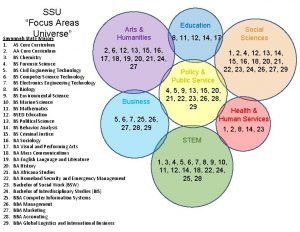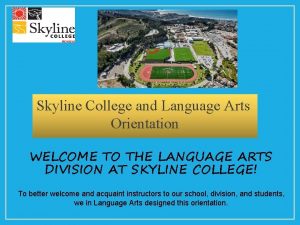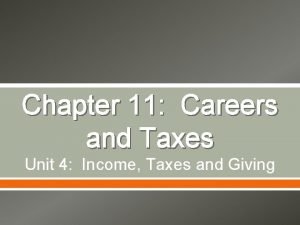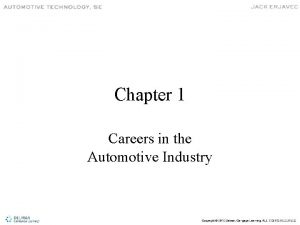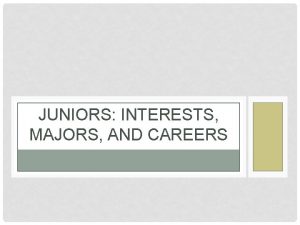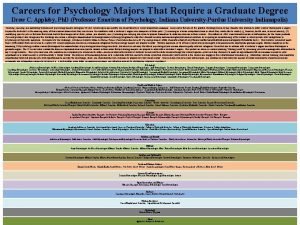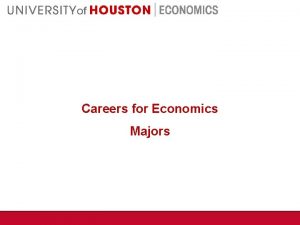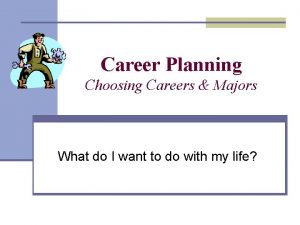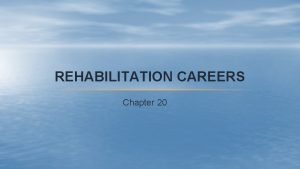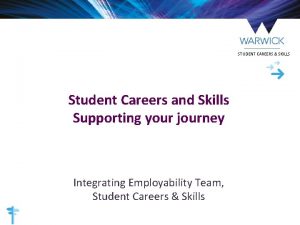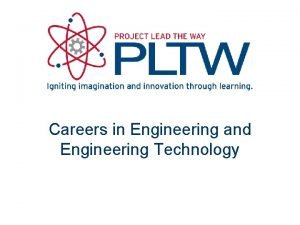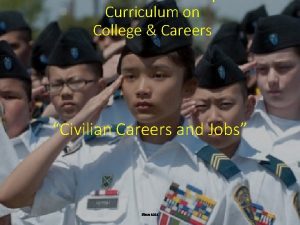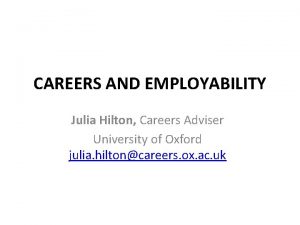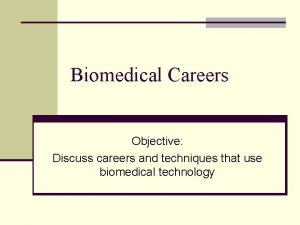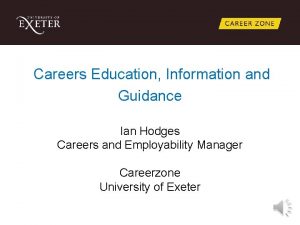Majors and Careers Chapter 15 Careers and the





















- Slides: 21

Majors and Careers Chapter 15

Careers and the New Economy • Base your decisions about major and career path on: ▫ Information about yourself ▫ Long-term demands of the job market • Characteristics of today’s economy ▫ ▫ ▫ ▫ Global Unstable Innovative Without boundaries Customized Ever-changing Social

Careers and the New Economy • Building the right mind-set for the future ▫ A degree does not guarantee employment ▫ You are responsible for your career ▫ To advance, accept risks ▫ A first career choice may not be permanent ▫ Start now to build a portfolio of academic and co-curricular experiences (continued)

Working with an Academic Adviser • Prepare for your first meeting • Follow these rules on selecting courses: ▫ Most take four to six courses a term ▫ Know days and times classes meet and make sure they don’t overlap ▫ Register as early as possible ▫ Do not cram all of your classes into one or two days ▫ Go for a mix of hard and easy classes

Self-Exploration in Career Planning • Self-assessment ▫ Process of gathering information about yourself in order to make informed decisions • Factors that can affect career goals: ▫ ▫ ▫ Values Skills Aptitudes Personality Life goals and work satisfaction Interests

Self-Exploration in Career Planning (continued) • Values ▫ Things you most desire in a career, in relation to how you want to live ▫ A career choice related to your core values is likely to be the best choice • Skills ▫ Personal ▫ Workplace ▫ Transferable

Self-Exploration in Career Planning (continued) • Aptitudes ▫ Acquired or natural ability for learning ▫ Proficiency in a particular area • Personality ▫ Makes you who you are ▫ Don’t ignore when you make career decisions ▫ Myers-Briggs Type Indicator assessment � Make decisions � Perceive the world � Interact with others

Self-Exploration in Career Planning (continued) • Life goals and work values ▫ Two factors can change how we feel about our success and happiness: �Achieving the life goals we’ve set for ourselves �Gaining satisfaction from our work • Interests ▫ Good career exploration begins with considering what you like to do and relating that to your career choices

Exploring Your Interests • Try a major you think you’ll like and that makes sense given your identity • John Holland ▫ Developed a model that organizes career fields into six general categories ▫ Career fields are grouped according to what is required and what rewards are provided

Holland’s Hexagonal Model of Career Fields

Being Career-Minded in College • • • Visit the career center yearly Explore the career center Web site Attend your college’s career fairs Take a variety of classes and watch grades Network Discover leadership opportunities Build communication skills Develop computer skills Create and monitor your digital footprint

Tech Tip: Join the Professional Community • To research a professional community that you’re interested in joining: ▫ Conduct industry and career research ▫ Do some research on yourself ▫ Get familiar with professional organizations ▫ Find ways to gain real experience �Check with your college’s career center about internships

Getting Experience • Experiential learning ▫ Meet people who may later serve as important employment references ▫ Ways to pursue: �Volunteer �Service-learning �Study abroad �Internships and co-ops �Student projects and competitions �Research

Getting Experience (continued) • Working in college ▫ Gain professional experience ▫ Earn money for tuition, books, and living expenses ▫ Network/make connections ▫ Learn more about yourself and others ▫ Develop key skills, such as communication, teamwork, problem solving, work ethics, and time management

Getting Experience (continued) ▫ On-campus employment �Work schedules are often flexible �Connect with people who may later consult as mentors or professional references �Students who work on campus are more likely to graduate �Some jobs are reserved for work-study students ▫ Off-campus employment �May pay better �May be more convenient �May be in an organization where you want to continue working

Job-Search Strategies • Learn the names of the major employers in your college’s geographic area • Check the Web site of the state agency that provides information about employment opportunities • Visit employment agencies • Visit online job boards and look at the classified ads in the local and student newspapers • Be aware that many jobs are never posted • Realize that who you know is important

Job-Search Strategies • Market yourself ▫ If you don’t do it, no one else will ▫ Actions speak louder than words ▫ Got ideas? Share them ▫ Get an edge over your competition ▫ It isn’t all about you (continued)

Job-Search Strategies (continued) • Build a résumé ▫ Choose between the chronological or skills-based formats ▫ Employers spend 7 to 10 seconds screening each résumé ▫ Single page is usually appropriate • Write a cover letter ▫ Address to a specific individual ▫ Proofread carefully ▫ Explain how hiring you will benefit the organization

Job-Search Strategies (continued) • Interview preparation �Start with the organization’s or company’s Web site �Review competitors’ Web sites �Ask for advice �Use your library �Note the employer’s goals and values �Research the company’s products and services �Find out the company’s strategic goals, special projects, and new developments �Take your research with you to the interview

Job-Search Strategies • Practice interviewing ▫ Participate in a mock interview ▫ Many career centers have virtual practice interview software for you to gain experience • Appropriate interview conduct ▫ Dress appropriately ▫ Arrive to the interview on time ▫ Follow up (continued)

Skills Employers Seek • Content skills ▫ Intellectual or “hard” skills ▫ Acquired as you gain mastery in your field • Transferable skills ▫ Skills that apply or transfer to a variety of settings ▫ Communication skills, presentation skills, leadership skills, team skills, interpersonal skills, personal traits, critical thinking and problem solving
 Test for english majors-band 4
Test for english majors-band 4 Youth stone dead meaning
Youth stone dead meaning Gju majors
Gju majors Savannah state university majors
Savannah state university majors Uwlax majors
Uwlax majors Texas state psychology program
Texas state psychology program Uwb degree audit
Uwb degree audit Ung oconee majors
Ung oconee majors Skyline orientation
Skyline orientation Wku majors
Wku majors Golden palace
Golden palace Foundations u.com
Foundations u.com Chapter 2 automotive careers and ase certification
Chapter 2 automotive careers and ase certification Hình ảnh bộ gõ cơ thể búng tay
Hình ảnh bộ gõ cơ thể búng tay Ng-html
Ng-html Bổ thể
Bổ thể Tỉ lệ cơ thể trẻ em
Tỉ lệ cơ thể trẻ em Voi kéo gỗ như thế nào
Voi kéo gỗ như thế nào Tư thế worm breton
Tư thế worm breton Hát lên người ơi
Hát lên người ơi Các môn thể thao bắt đầu bằng tiếng bóng
Các môn thể thao bắt đầu bằng tiếng bóng Thế nào là hệ số cao nhất
Thế nào là hệ số cao nhất



